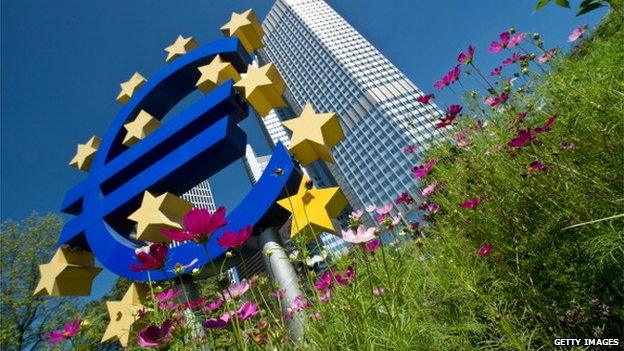Deja vu for the ECB
- Published
- comments

Berlusconi tries to topple Italy's government (again). Greece may need another loan and is experiencing political turmoil with the problematic Golden Dawn party. And ongoing funding challenges for banks in peripheral eurozone countries mean the European Central Bank (ECB) may offer another round of cheap cash.
It feels like we've been here before. Certainly a bit of deja vu.
No doubt these lingering issues in the eurozone crisis will affect the ECB as it meets today.
As we've heard many times from central bankers, there is a limit to what the monetary policy can do about political stability or the decisions over Greece's debt.
But the fragility of eurozone banks and the pressures from the US point to why the ECB may offer another set of cheap loans to banks. It would be the third year running for the central bank to offer the so-called LTRO, or long-term refinancing operation, to eurozone banks. In 2011 and 2012, the ECB lent about 1 trillion euros that helped to prop up eurozone banks during some of the worst times in the crisis. About half has been paid back, but it looks like eurozone banks may need more help to cope with the ongoing stresses. Plus, the situation in the US isn't helping.
First, despite the ECB's new policy of "forward guidance", where the bank has said that it will hold rates at a low level (currently at a record low 0.5%), commercial lending rates have risen.
It's not because prices are rising. Inflation has fallen to the lowest level in more than three years. At just 1.1%, it is substantially below the ECB's target of keeping inflation below, but close to, 2%. So, there aren't many indicators pointing to an imminent rate rise.
Yet, commercial rates for lending are rising. This happened during the crisis when liquidity, or cash, was less available to eurozone banks and thus their cost of borrowing rose. By offering cheap loans, the ECB helped to lower the cost of borrowing for banks.
But a key measure of funding costs for eurozone banks, the three-month Euribor, which gives the rate at which they can borrow money for three months, has nearly doubled to 0.225% since last year. By comparison, despite the US woes, three-month money costs one-tenth of that at just 0.02% for the sovereign and around 0.09% for commercial lending.
It's not a huge amount when compared with the stressed period at the height of the crisis, but the trend is worrying for indebted companies in countries such as Italy.
In fact, it was worrying enough for ECB president Mario Draghi to say that he would offer another LTRO if needed.
According to the International Monetary Fund, the leverage ratio of Italian companies, which is the amount of debt as a proportion of debt plus equity, is the third highest in the eurozone after Portugal and Spain. It is as high as 60% for small firms, which is why it's not surprising that 30% are categorised as distressed. Worryingly, they account for half of all of the corporate debt in the country.
So a rise in funding costs could affect the ability of such firms to stay afloat. It's not entirely clear that the money lent to banks finds its way to small companies. That's why if LTRO3 is announced, it could be for longer duration loans or even be tied to lending to small firms. The latter would be similar to the Bank of England's Funding for Lending scheme.
Also, the US government shutdown and the prospect of the Fed tapering its cash injections are playing a role.
The first shutdown in 17 years of parts of the US government sent the euro higher to more than $1.35. The Fed not tapering its cash injections last month also boosted the euro. A stronger euro makes exports more expensive and hampers the recovery. Weaker exports and more expensive credit don't make for the best combination of economic factors. It adds to the case that the ECB has to "loosen" monetary conditions further to support the eurozone, which has just emerged from the longest recession on record.
Chances are that Mr Draghi may hold off on another injection of cheap cash to allow forward guidance a bit more time to work. But circumstances in Europe and US could begin to dictate the timeline for the ECB.